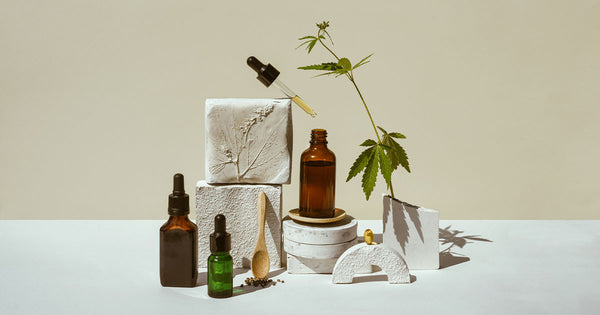CBD Isolate vs. CBD Distillate: Which One Is Right For You?
Jun 21, 2022

Cannabidiol (CBD) is one of the most popular cannabinoids from the cannabis plant. CBD can be found in everything from sweet and sour gummies to infused bath bombs and many more products. With so many CBD products available, how do you know which one is the right one for you?
CBD isolates and CBD distillates is two of the most potent and versatile CBD products on the market. Smoke them. Dab them. Vape them. Cook with them. Infuse them into lotions and creams. It is all fair game.
If you want CBD in its purest form, distillates and isolates are the way to go. Explore the pros and cons of each cannabis extract with our complete guide.
CBD 101: Broad Spectrum CBD vs. Full-Spectrum CBD
Understanding the difference between CBD isolate and CBD distillate requires knowing the difference between broad-spectrum CBD and pure CBD products.
Full-Spectrum CBD
Full-spectrum CBD, also known as whole-plant CBD, is a cannabinoid-based product containing a more comprehensive range of natural compounds from the cannabis plant than other products. Full-spectrum products have a high concentration of cannabinoids, terpenes, flavonoids, and other essential oils.
Full-spectrum CBD can contain up to and over 0.3% THC, depending on the legality of THC in the state. THC is the compound that produces the intoxicating and euphoric feeling and other potential health benefits.
Using full-spectrum CBD products can provide an amplified therapeutic effect while reducing the adverse effects of specific cannabinoids. The entourage effect involves the synergistic interaction between all of the compounds found in the cannabis plant.
Broad-Spectrum CBD
Broad-spectrum CBD products contain a wide range of cannabinoids, terpenes, and flavonoids.. If you want all the benefits of the entourage effect and none of the high, broad-spectrum CBD may be for you.
Since there is barely any THC in broad-spectrum oil, users will not feel “high.” However, the effects may not be as effective without all cannabinoids working together. Still, the other compounds found in broad-spectrum products may still deliver many therapeutic benefits.
How Is CBD Isolate and CBD Distillate Different?
CBD isolate and distillate differ from full-spectrum CBD products in many respects, particularly their chemical profiles. Due to the entourage effect, the broad-spectrum and full-spectrum products may have enhanced therapeutic benefits compared to isolates and distillates.
Generally, CBD isolates and distillates contain a higher concentration of CBD without other essential oils from the hemp plant like terpenes and flavonoids. CBD distillates can be combined with other cannabinoids, terpenes, and compounds from hemp plants to improve their effects, flavor, and aroma.
Cannabis terpenes are responsible for the distinct smell of the cannabis plant. Removing these creates an odorless and flavorless product, making the products a great base for a wide range of infusions. Terpene removal allows processors to create unique flavors and aromas without the telltale cannabis smell.
What Is CBD Isolate?

CBD isolate contains up to 99.9 percent CBD and no THC. CBD isolate is made by removing the rest of the hemp compounds and separating only CBD through an extraction and purification process. The result is an odorless and tasteless crystalline powder or solid hemp extract.
High-quality CBD isolate does not contain heavy metals, pesticides, residual solvents, and other contaminants. In some cases, these pure CBD extracts can be infused with natural terpenes to create a “terpsolate.”
How Is CBD Isolate Made?
CBD isolates are usually made using supercritical carbon dioxide (CO2) or ethanol-based extraction processes. The crude oil is then purified using multiple refinement processes, sometimes including chromatography.
- After the primary extraction process is complete, the extracted hemp oil is winterized for about 24 hours to remove other compounds like fats, waxes, and lipids. These unwanted compounds coagulate over the purified oil and are filtered out.
- The winterized oil is then distilled in a wiped film or a short path, which will concentrate the CBD levels while removing terpenes, flavonoids and other components. This process leave you with a nice golden colored oil.
- Through various crystallization techniques using solvents, the most basic one being supersaturation, the CBD distillate is turned into CBD isolate
- The resulting isolate is heated under a vacuum to purge everything but the CBD.
End products: Concentrate, vape cartridges, tinctures, edibles, topicals
Appearance
CBD isolate can come in either CBD crystal or powder form and is usually white. The CBD isolate can have a light yellow tint or off-white color if it’s a little impure.
What Is CBD Distillate?
CBD distillate is a highly refined concentrate that has been distilled to contain a high concentration of CBD and barely any THC. CBD concentrations in distillate can start at around 70 or 80 percent. processors can re-introduce cannabinoids, terpenes, flavonoids, and fatty acids into the final product.
How Is CBD Distillate Made?
Cannabis distillate undergoes an extraction, winterization, decarboxylation, and distillation process. The initial extraction process can use hydrocarbons (butane and propane), supercritical CO2, or ethanol as a solvent. CBD distillate may also be created from solventless extraction methods.
- Cannabis oil is extracted from biomass using solvent-based or solventless extraction techniques.
- Winterization in cold temperatures separates the unwanted plant materials (chlorophyll, waxes, fats) from the oil.
- Decarboxylation (heating) activates the acidic compounds under a vacuum. A gentle heating process activates CBDA into CBD.
- Distillation involves heating the oil at specific temperatures under a vacuum to evaporate the desired cannabinoid and re-cool the cannabinoid vapor into a liquid.
- Several distillation passes can be performed to improve the purity of the oil.
End products: Concentrate, vape cartridges, edibles, topicals, tinctures, transdermal patches
Appearance
CBD distillate has a viscous and syrupy consistency. Distillate can range in color, from light yellow to a darker amber hue, depending on the quality of the biomass and distillation process.
CBD Isolate Pros and Cons
CBD isolate’s purity and potency are its main draws but is isolate just a one-note product?
Pros
- Good for first-time CBD users
- Non-intoxicating
- Up to 99 percent pure
- Easy to use and dose
- Odorless and tasteless (perfect for making edibles)
- Found in a wide range of products (edibles, topicals, tinctures, etc.)
- User will not fail a drug test
Cons
- Missing essential compounds from the plant
- Does not produce an entourage effect
CBD Distillate Pros and Cons
CBD distillates offer purity, potency, and versatility, all great aspects of an extract. What are the potential downsides of this high-potency CBD product?
Pros
- High concentration of CBD
- May be non-intoxicating
- Easy to consume
- Minimal odor and taste
- Can be used to make various infused products
Cons
- Limited range of cannabinoids and terpenes
- Reduced entourage effect
Who Should Try CBD Isolate?
CBD isolate is an excellent alternative to full-spectrum products that can produce intoxicating effects due to the high THC levels. Users looking for relief from anxiety, pain, and inflammation without the high can turn to CBD isolate products.
CBD isolates can be heated and inhaled via dab rigs or vaporizers for quick-acting relief or be added to food and drink for a smoke-free experience.
Who Should Try CBD Distillate?
CBD distillate provides numerous health benefits without the high. Cannabis users who want to experience the full effect of other cannabinoids and terpenes can go for CBD distillates, which may contain re-introduced compounds.
CBD distillate can be easily consumed via inhalation, orally, sublingually, or topically. It is a versatile product that can create any edible or topical recipe you can imagine.
How to Use CBD Isolate and CBD Distillate

CBD isolate and CBD distillate have similar effects and uses. They can be used to create everything, from CBD-enhanced entrees to vape oil juices.
Using CBD Isolate
CBD isolates are usually consumed via inhalation for fast-acting and long-lasting effects. Users can heat CBD isolates using a dab rig, e-nail, bong, water pipe, or vaporizer.
Since CBD isolate comes in powder or solid form, it can be broken down and added in bowls or joints to enhance the potency of the experience.
Because of CBD isolate’s high potency, users are recommended to start with a small dose, ranging from 5 to 25 mg of CBD. Dosage levels can be increased after seeing how the product affects the user.
Using CBD Distillate
CBD distillate has a wide range of uses. It can be consumed in its raw form or infused into various formulations. CBD distillate can be taken in its raw form, either orally or sublingually.
CBD distillate can be used as a base to edibles or topicals. Distillates allow producers to infuse the desired cannabinoid into a product. At home, users can add distillate into their favorite food or drink.
In topicals, the CBD can be mixed with a carrier oil and applied transdermally. CBD will be absorbed into the skin to provide many health benefits without absorbing into the bloodstream.
How to Shop for CBD Isolate and Distillate

CBD products are wildly popular, creating a high demand and supply for every type of CBD product. While some CBD products may be high-quality, others may provide misleading claims or mislabeled products.
Consumers must rely on their research to find quality CBD distillate and isolate containing pure ingredients without any harmful additives or contaminants.
Follow these best practices when shopping for a high-CBD hemp concentrate:
- Check the ingredients - Make sure the product actually contains CBD distillate or isolate. In some cases, products may only contain hemp seed oil. Consider other ingredients for dietary restrictions or allergens.
- Find the source of the CBD - Consider buying products made from organic hemp grown in the U.S. Hemp grown in the U.S. should legally have under 0.3 percent THC.
- Read the certificate of analysis - COAs are lab test reports from third-party labs issued after testing a product for purity and potency.
- Look for cGMP certification - Buy from CBD brands that produce their products in cGMP certified facilities for the ultimate quality and purity.
Final Thoughts on CBD Isolate vs. CBD Distillate
Understanding which CBD product to use for its medicinal relief or produce to expand your business requires knowing the desired experience. Do you prefer the powdery consistency of isolates? Do you value the viscosity of distillates?
While CBD distillates and isolates can provide considerable relief, minor cannabinoids and terpenes also play an essential part in how each compound benefits the human body. Explore CBD in its purest form and full-spectrum CBD to find the right product for you.






